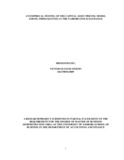| dc.contributor.author | Otieno, Victor O | |
| dc.date.accessioned | 2012-11-13T12:29:37Z | |
| dc.date.available | 2012-11-13T12:29:37Z | |
| dc.date.issued | 2011 | |
| dc.identifier.uri | http://erepository.uonbi.ac.ke:8080/handle/123456789/3674 | |
| dc.description.abstract | The study examines the Capital Asset Pricing Model (CAPM) for the Kenyan stock market using the monthly adjusted stock returns for companies listed at the Nairobi Stock Exchange for the period of January 1998 to December 2010. The fmding of this study does not show the theory's basic result that higher risk (beta) is associated with higher level of return. The study however explains the excess returns over the risk free rate of return, represented in this study by the 91 day t-bills rate of the government of Kenya. This thus supports the linear structure of CAPM equation.
The theory predicts that the intercept should be equal to zero and the slope be the excess return on the market portfolio. The results of the study lead to negate the above hypotheses and offer evidence against CAPM. The tests conducted to check the non linearity of the relationship between return and betas support the hypothesis that the expected return-beta relationship is linear. Additionally, the study investigates whether CAPM adequately captures all important determinants of returns including the residual value of stocks. The results exhibit that residual risk has no effect on the expected returns of portfolios | en_US |
| dc.language.iso | en_US | en_US |
| dc.publisher | University of Nairobi, Kenya | en_US |
| dc.title | An empirical testing of the capital asset pricing model among firms quoted at the Nairobi Stock Exchange | en_US |
| dc.title.alternative | Thesis (MBA) | en_US |
| dc.type | Thesis | en_US |

